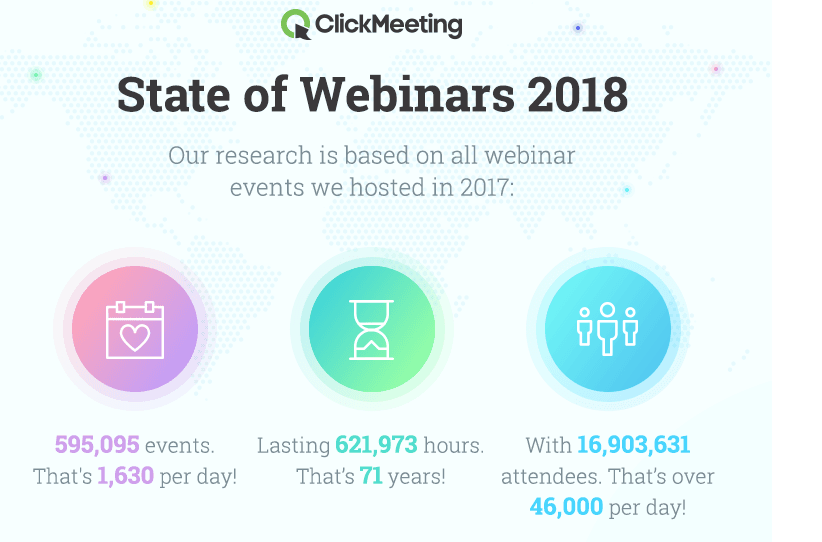Webinars have grown quite popular in recent years.
For many of us, they’ve become synonymous with daily life, either as part of an audience that’s attending one or as part of the bigger lot that is always busy purging webinar invitation emails from their inboxes.
In 2017, the number of webinars went up by about 7 percent, with 16 percent more attendees catching up with webinars during that period. And, as the following ClickMeeting report-cum-infographic shows, about two-thirds of webinars hosted were education-related, which should come as good news for individuals pursuing financial literacy.
Infographic Courtesy of ClickMeeting
For many Americans, financial literacy is a sticky issue. In its 2017 report, the National Foundation for Credit Counselling (NFCC) found that many Americans were struggling to keep up with credit card debt, with 39 percent carrying credit card debt on a monthly basis compared to 35 percent in 2016.
The same scary numbers are replicated in many other facets of personal finance, highlighting the need for financial literacy programs within the country.
This consequently brings us back to webinars, one of the most effective tools for imparting financial knowledge.
Here are a few specific reasons why webinars are so effective when used for financial education.
1. Links you up with financial coaches and mentors
In recent years, and especially after the Great Recession, it’s become quite challenging to navigate the world of personal finance, with individuals struggling to make sense of the complex issues surrounding retirement funds, debt management, health insurance, investment, and personal budgeting.
This is one of the areas that a financial coach can come in handy. Financial coaches and mentors can help you make sense of all the confusing facets of personal finance, empowering you to make better, more informed financial decisions.
Most webinars, at least the good ones, will usually have one or more presenter or moderator who is a specialist in their field. They give you the platform to engage with potential coaches via other communication platforms after the webinar is off-air, including via email, phone, or in-person, which makes it much easier than searching the web and scheduling appointments with coaches and consultants you might not even like.
2. Helps you expand your network
Another significant advantage of webinars for financial education is the potential for expanding your personal and professional network. Many personal problems, including financial illiteracy, are often best tackled with support from others, whether its family, friends or professionals.
Financial wellness webinars, especially those that allow attendees to interact during and after the webinar, can be quite effective at helping to build new networks. Use these webinars to reach out to moderators, speakers, and even fellow attendees whenever possible. Make sure to engage them afterward with queries or ideas, related or non-related to the webinar.
The larger personal network might just provide the motivation, ideas, and innovative solutions you need to better your finances.
3. Content is easily digestible compared to other educational tools
Apart from webinars, there are a ton of other methods you can use to become financially literate. These range from eBooks and online classes to sitting down with a financial advisor for help with financial management. For most of these, however, making sense of the content can be a challenge for many of us, especially when it comes to eBooks and online learning portals that often contain information that isn’t easy to decipher without assistance.
Webinars, on the other hand, can be quite effective as a platform for financial literacy. One 2016 study found that webinars were among the most effective, convenient and cost-efficient tools available for financial education. Participants in the study showed improved financial behaviors and increased knowledge as a result of their interactive participation in the webinars.
Plus, because webinars are basically virtual representations of physical learning sessions, content is easily digestible compared to self-learning platforms and tools such as eBooks.
Bottom Line
Not all financial literacy webinars are created equal. Many are created by financial consultants who are only in it for the money, while others are created by businesses looking to build their brands.
Therefore, always do your research before wasting your time on one. Make sure your hosts are qualified to speak about financial literacy and how much value you can draw from the webinar. Consult colleagues and be on the lookout for professional associations that offer webinars for the best results.






